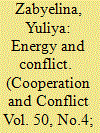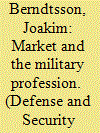| Srl | Item |
| 1 |
ID:
142068


|
|
|
|
|
| Summary/Abstract |
Attacks on oil and gas infrastructures by terrorists and criminals in places like Nigeria, Colombia, Iraq and Russia have amplified the vulnerability of critical energy infrastructures (CEIs) to deliberate physical attacks. Being unable or unwilling to protect CEIs, many national governments have made attempts to alleviate these vulnerabilities through outsourcing of security, i.e. contracting the responsibility to protect CEIs out to non-state actors. This article advocates the need to conceptualize security outsourcing in the domain of critical energy infrastructure protection (CEIP) in order to explain a variety of regulatory choices made by governments in this domain. Based on a qualitative analysis of four case studies, the article discusses various types of security outsourcing in the protection of CEIs, including the militarization of national oil companies, public–private partnerships and the involvement of international organizations and local social groups. The typology may serve as a tool of describing, classifying and evaluating various forms of security outsourcing. The findings of the article help to deconstruct the complexity of security outsourcing and capture some of the major contemporary trends in energy security.
|
|
|
|
|
|
|
|
|
|
|
|
|
|
|
|
| 2 |
ID:
165363


|
|
|
|
|
| Summary/Abstract |
The rise of private military and security companies (PMSCs) challenges our notion of military professionals. PMSCs bring new claims to professional status and legitimacy outside military institutions and represent an increasing diffusion of - and competition over - military and security expertise. In light of this development, understanding the formation of professional identities in military and private security organisations is as an important undertaking. This paper contributes to this endeavour by analysing professional self-images in the Swedish Armed Forces and how these relate to PMSCs. The study is based on data collected from official documents, semi-structured interviews and a small-scale survey among senior military officers. Focusing on military understandings of PMSCs and contractors, the analysis provides much-needed insight into relational aspects of professional identity formation outside the US context. Furthermore, it points to discrepancies in organisational and group levels in understandings of commercial security actors, and paves the way for future research.
|
|
|
|
|
|
|
|
|
|
|
|
|
|
|
|